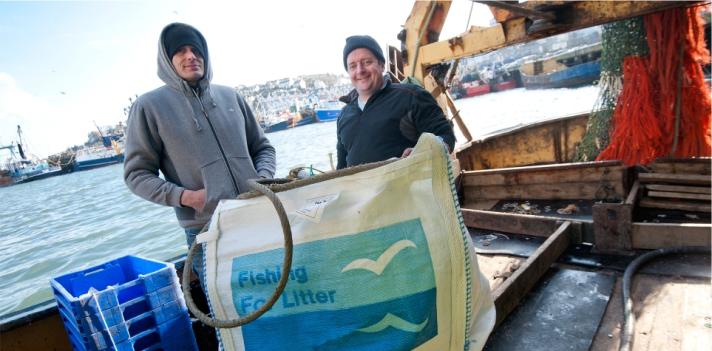Marine litter is generating increasing concern at international, regional, macro-regional and national levels. The European Union is playing its part in addressing the problem in particular by providing public support to mitigation actions undertaken by the fishing industry through the former European Fisheries Fund 2007 – 2013 (EFF) and the current European Maritime and Fisheries Fund 2014 – 2020 (EMFF). The present report analyses the contributions of these funds to operations of marine litter mitigation undertaken by the fisheries sector itself or for its direct benefit, based on a sample of 14 EU Members States (MS) planning concrete actions under the EMFF: BE, BG, CY, DE, ES, FI, HR, IE, IT, PL, PT, RO, SE and UK.
During the EFF programming period, seven out of the 14 MS surveyed (ES, IE, IT, PL, PT, SE and UK) implemented a total of 59 operations related to marine litter with overall eligible costs of EUR 5.8 million and an EFF budget of EUR 3.4 million. Operations were mainly collective actions, but also actions under the sustainable development of fisheries areas. Almost half focused on the retrieval of abandoned, lost or discarded fishing gear (ALDFG) i.e. "fishing for litter", with actions for the provision of litter collection facilities and equipment, and the treatment and processing of litter, also important. Extrapolating these results to the 7 coastal states not surveyed suggests that overall EFF support to marine related operations could have been in the order of EUR 5.2 Million (3.4 for the 7 MS surveyed and 1.8 for the 7 costal states not surveyed)
Under the EMFF, the number of MS planning actions for the collection of ALDFG and marine litter by fishers (EMFF Article 40.1(a)) increased to 14 (BE, BG, CY, DE, ES, FI, HR, IE, IT, PL, PT, RO, SE and UK have all committed resources in their respective Operational Programmes (OPs). The target number of operations in the OPs is 108 with planned public and EMFF contributions around EUR 31 and 22 million respectively. In terms of total public or EMFF contributions, "fishing for litter" actions represent only 2% of all measures foreseen under the various measures in support of the EU fishing fleet. Up until the end of 2016 only four MS had started to implement "fishing for litter" activities, with 12 operations selected (representing 11% of the planned number of operations and 2% of the targeted EMFF financial support for the programming period). Taking into account activities planned for the near future (even if not yet selected), the number of operations rises to 29 (27% of the target) in eight MS.
At this stage, no operations for the investment in facilities for marine litter collection in ports were identified under EMFF Art. 43.1. However, other initiatives by the fishing sector may have been implemented under other measures in particular under Community-Led Local Development. All the above EMFF estimates should thus be considered as conservative.
In addition to measures for the collection of marine litter by the fishing sector, other initiatives not involving that sector may be implemented under the Community-Led Local Development (CLLD, UP4) and the Integrated Maritime Policy (Art. 80.1.b and c), are potentially relevant to marine litter mitigation . For example, five IMP operations (all in NL) with EUR 1.5 million of EMFF contributions focus on research, monitoring and awareness raising activities.
Actions for the mitigation of marine litter under EFF and EMFF play only a minor role both in terms of the total number of EFF/EMFF operations and the budgets committed, and EMFF implementation progress has been slow as for the rest of EMFF operations. Nevertheless, the EFF, and now the EMFF, offer possibilities through different measures to involve the fishing industry in addressing the marine litter problem, be it the retrieval of ALDFG, the provision of facilities and equipment for marine litter collection, research studies, or awareness raising activities.
In conclusion, although interest by MS in utilising EU funding support to involve the fishing industry in the reduction of marine litter has drastically increased from the EFF to the EMFF programming period, indicators are lacking to evaluate the effectiveness and efficiency of the marine litter-related actions undertaken by the fishing industry itself or of direct benefit to that industry. Monitoring and evaluating such indicators would contribute to identifying the best approaches for the involvement of the fishing industry in the reduction of marine litter in general, and of litter emanating from the fishing and aquaculture industry in particular

